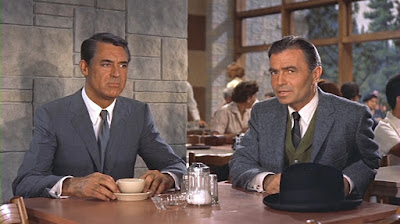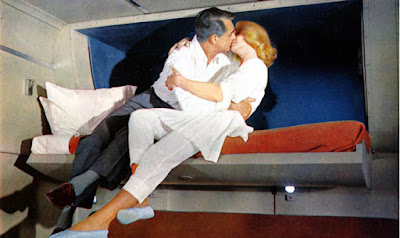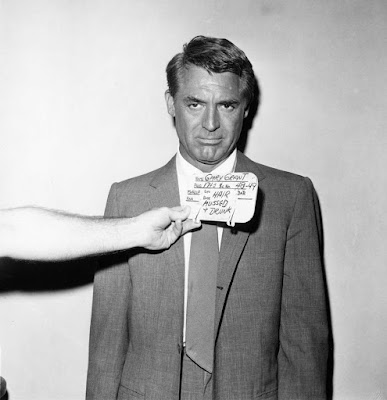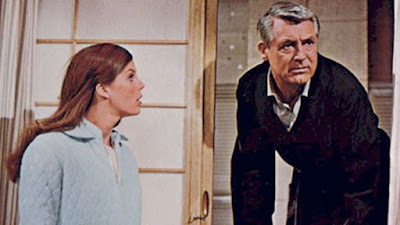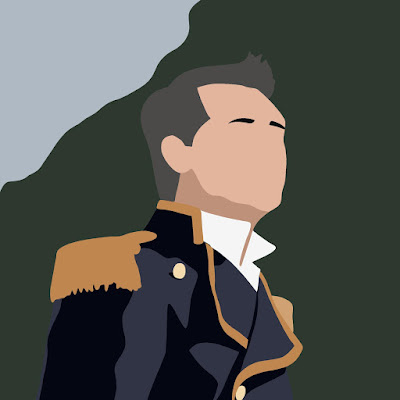North by Northwest was Cary Grant's 66th full length feature film and was released this day in 1959.
Summary:
Madison Avenue advertising man, Roger Thornhill (Cary Grant), finds himself thrust into a world of espionage when mistaken for another man. When Thornhill tries to make sense of the case, he is framed for murder. On the run from the police, he boards the 20th Century Limited train bound for Chicago where he meets a beautiful blonde, Eve Kendall (Eva Marie Saint), who helps him to evade the authorities....but is Eve the innocent bystander he thought she was?
Cast:
Cary Grant...Roger Thornhill
Eva Marie Saint...Eve Kendall
James Mason...Phillip Vandamm
Jessie Royce Landis...Clara Thornhill
Leo G. Carroll ...The Professor
Josephine Hutchinson...Mrs. Townsend
Philip Ober...Lester Townsend
Martin Landau...Leonard
Adam Williams...Valerian
Edward Platt...Victor Larrabee
Robert Ellenstein...Licht
Les Tremayne...Auctioneer
Philip Coolidge...Dr. Cross
Patrick McVey...Sergeant Flamm
Edward Binns...Captain Junket
Ken Lynch...Charley
Did You Know?
While filming Vertigo (1958), Sir Alfred Hitchcock described some of the plot of this project to frequent Hitchcock leading man and "Vertigo" star James Stewart, who naturally assumed that Hitchcock meant to cast him in the Roger Thornhill role, and was eager to play it. Actually, Hitchcock wanted Cary Grant to play the role. By the time Hitchcock realized the misunderstanding, Stewart was so anxious to play Thornhill that rejecting him would have caused a great deal of disappointment. So Hitchcock delayed production on this movie until Stewart was already safely committed to filming Otto Preminger's "Anatomy of a Murder (1959)" before "officially" offering him the role in this movie. Stewart had no choice but to turn down the offer, allowing Hitchcock to cast Grant, the actor he had wanted all along.
Vandamm remarks in the Rapid City, South Dakota house scene that the plane taking them out of the country should touch down in "ten minutes". It is exactly ten minutes in real-time when they see the plane landing on the landing strip.
Cary Grant found the screenplay baffling, and midway through filming told Sir Alfred Hitchcock, "It's a terrible script. We've already done a third of the picture and I still can't make head nor tail of it!" Hitchcock knew this confusion would only help the movie; after all, Grant's character had no idea what was going on either. Grant thought the movie would be a flop right up until its premiere, where it was rapturously received.
Sir Alfred Hitchcock filmed Cary Grant's entrance into the United Nations building from across the street with a hidden camera. When he gets to the top of the stairs, a man about to walk down does a double take upon seeing the movie star.
The scene where the crop duster is chasing and shooting at Thornhill was filmed with a real airplane while the shot where the plane crashes into the fuel truck was done using large models of both truck and plane.
It was journalist Otis L. Guernsey, Jr. who suggested to Sir Alfred Hitchcock the premise of a man mistaken for a nonexistent secret agent. He was inspired, he said, by a real-life case during World War II, known as Operation Mincemeat, in which British intelligence hoped to lure Italian and German forces away from Sicily, a planned invasion site. A cadaver was selected and given an identity and phony papers referring to invasions of Sardinia and Greece. The Man Who Never Was (1956) recounted the operation.
In a Turner Classic Movies interview, according to screenwriter Ernest Lehman (who worked in close collaboration with Sir Alfred Hitchcock), the working title was "In A Northwesterly Direction". The head of the story department at MGM said "Why don't you call it 'North by Northwest'?" Lehman says that he and Hitchcock adopted that as the new working title, always assuming that they'd come up with something better. Hitchcock also jokingly wanted to call it "The Man in Lincoln's Nose", but claimed the idea was vetoed by the Park Commissioner. Other working titles included "Breathless", "In a North West Direction", and "The C.I.A. Story". So the creators thought the title was a meaningless placeholder. However, in fact Thornhill flew north from Chicago to South Dakota on Northwest Airlines, or "north by Northwest."
The footage of Park Avenue in Manhattan, which appears as a reflection in the facade of an office building under Saul Bass' opening credits, is an approximately 12-seconds-long "loop" which plays four times. The "splice" in the loop is covered by a 2-second lap dissolve each time.
If the fictional Thornhill had plans, as he stated, to attend the Winter Garden Theatre when the movie opened in the U.S. in July of 1959 (when he was kidnapped from the Oak Room), his tickets would have been for "West Side Story."
Thornhill orders a Gibson on the train. This is composed of gin and dry vermouth, as in a traditional martini, but with cocktail onions instead of olives.
Originally cast and crew were staying at the Palms Motel in McFarland, CA for the crop dusting scene. However, the first night staying there they realized the bar closed at 10:30pm each evening. So they moved their accommodations for the remaining stay of the crop dusting scene to Bakersfield, CA.
In 2006, a panel of GQ Magazine fashion experts said the gray suit worn by Cary Grant throughout almost the entire movie was the best suit in movie history. It was also the most influential on men's style, stating that it has since been copied for Tom Cruise's character in Collateral (2004) and Ben Affleck's character in Paycheck (2003). This sentiment has been echoed by writer Todd McEwen, who called it "gorgeous", and wrote a short story "Cary Grant's Suit", which recounted this movie's plot from the viewpoint of the suit.
(See blog: Well He's A Well Tailored One )
Quotes:
[Thornhill is wearing sunglasses to hide his identity]
Ticket Seller: Something wrong with your eyes?
Roger Thornhill: Yes, they're sensitive to questions.
Roger Thornhill: Now you listen to me, I'm an advertising man, not a red herring. I've got a job, a secretary, a mother, two ex-wives and several bartenders that depend upon me, and I don't intend to disappoint them all by getting myself "slightly" killed.
Roger Thornhill: No. No, Mother, I have not been drinking. No. No. These two men, they poured a whole bottle of bourbon into me. No, they didn't give me a chaser.
Eve Kendall: Roger O. Thornhill. What does the O stand for?
Roger Thornhill: Nothing.
Man at Prairie Crossing: That's funny, that plane's dustin' crops where there ain't no crops.
Eve Kendall: [Hanging by their fingers from Mount Rushmore] What happened with your first two marriages?
Roger Thornhill: My wives divorced me.
Eve Kendall: Why?
Roger Thornhill: They said I led too dull a life.
Roger Thornhill: You're police, aren't you? Or is it FBI?
The Professor: FBI, CIA, ONI... we're all in the same alphabet soup.



